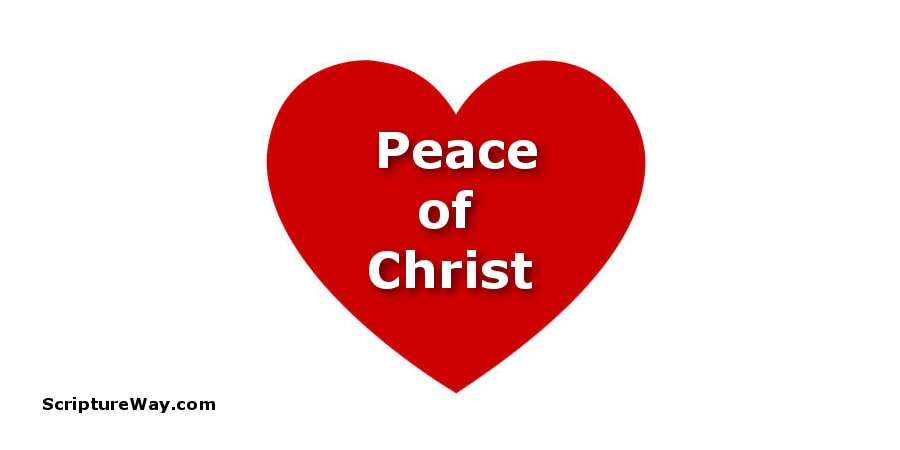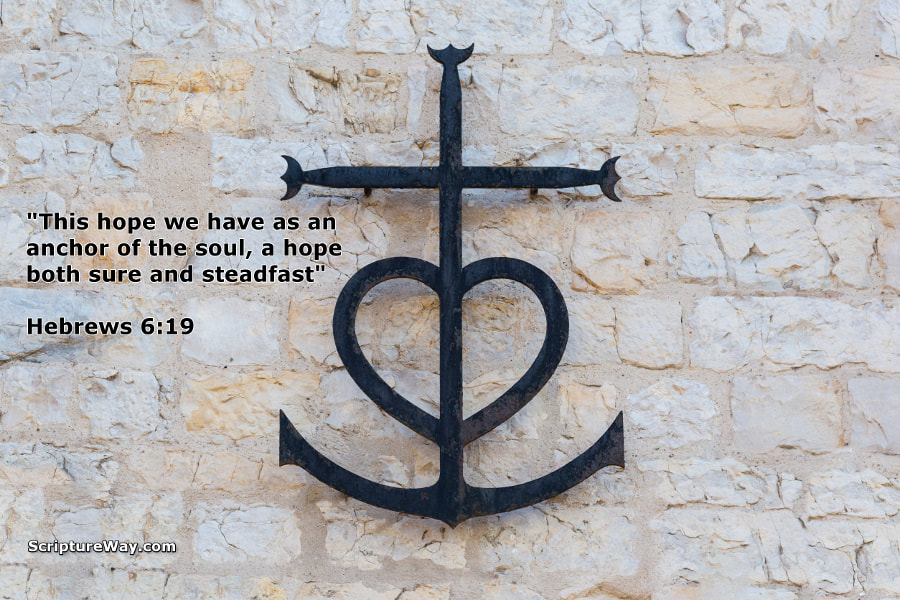"And let the peace of Christ rule in your hearts, to which indeed you were called in one body. And be thankful." (Colossians 3:15 ESV)
This lesson defines the peace of Christ and explains how we can have the peace of Christ ruling in our hearts. Bible verse quotations are from the English Standard Version (ESV) unless indicated otherwise (Ref. 1).
Consider. Do you have the peace of Christ ruling in your heart?
1. The peace of Christ is the tranquility of our heart and mind knowing that God has saved us and has forgiven us through his Son Jesus
As believers in Christ, our hearts are calm and tranquil because we know we are saved by God's grace through faith in Christ (Thayer's Greek Lexicon - Ref. 2, Ephesians 2:8-9). We have the peace of Christ in our hearts because we know that God loves us and has forgiven our sins (Romans 5:1, Romans 5:8, 1 John 1:9). We have the peace of Christ in our hearts because we know we have received God's gift of eternal life (John 3:16, Romans 6:23, John 10:27-28).
When we trust in Jesus as our Lord and Savior, we have nothing to fear from God. We have peace with God. Jesus said, "Let not your heart be troubled; you believe in God, believe also in Me" (John 14:1 NKJV). 2. The peace of Christ comes from Christ, not from the world. Jesus is the giver of true peace.
On the night before his crucifixion and death, Jesus was preparing his disciples for his departure from them. Jesus told them about this precious gift that he was giving them -- his peace. Jesus gave them -- and he gives us, people who have faith in him -- the same gift, his peace. Jesus says, "Peace I leave with you; my peace I give to you. Not as the world gives do I give to you. Let not your hearts be troubled, neither let them be afraid" (John 14:27).
The things of the world will not give us peace (1 John 2:15-17). Only Jesus, the one whose nature is peace, gives us true peace, the peace that surpasses understanding (Philippians 4:6-7). True peace, the peace of Christ, is tranquility of our soul despite the worldly circumstances around us. 3. The peace of Christ rules in our hearts when we are completely submitted to his will and have yielded control of our lives to him
The Greek word translated as "rule" in Colossians 3:15 means to direct and control (Thayer's Greek Lexicon - Ref. 3). To have the peace of Christ ruling in our hearts, we must yield completely to God's direction and control of our lives -- present and future. Don't be like Jonah who knew God's will for him and then rebelled against God (Jonah 1:1-3). Be like our Lord Jesus who lived on earth to do his Father's will (John 6:38) and said to his heavenly Father, "not my will, but thine, be done" (Luke 22:42 KJV).
When we trust God and are yielded to God's will for us in each of life's circumstances, we will know the peace of Christ. The apostle Paul writes, "And the peace of God, which surpasses all understanding, will guard your hearts and your minds in Christ Jesus" (Philippians 4:7). The peace of God [that peace which reassures our heart] keeps our thoughts and our hearts quiet and at rest as we trust in Christ Jesus (Philippians 4:7 AMP, Philippians 4:7 TLB). 4. God calls us as believers in Christ to live as one body in the peace of Christ
The Lord Jesus, by his blood shed on the cross, has made Jewish and Gentile believers into one (Ephesians 2:11-14). He has made believers of diverse (ethnic, national, gender, economic, civilized/uncivilized, etc.) background into one body (Galatians 3:28, Colossians 3:11, Ref. 4). He also calls us -- as diverse and uniquely gifted believers -- to live in unity as one body of Christ (Ephesians 4:1-6, Colossians 3:15, 1 Corinthians 12:12). Yet, Jesus is our peace (Ephesians 2:14). We can live with our brothers and sisters in Christ in the peace of Christ when we put on a heart of compassion, have patience with one another, forgive one another, and love one another as the scriptures instruct and as Jesus commanded (Colossians 3:12-14, John 13:34).
5. And be thankful
An "attitude of gratitude" is a hallmark of a Christian who is at peace with God, themselves, and other people. Through Christ, we can be thankful through difficult circumstances (1 Thessalonians 5:16-18). We have the peace of Christ knowing that our Lord Jesus loves us, has forgiven us, is with us in the present, and assures us of our future with him (Philippians 4:4-7, John 14:2-3 AMP).
Prayer. Lord Jesus, I yield control of my life to you. I submit to your will and direction for my life. Come, Lord Jesus, and rule in my heart. Thank you for giving me your peace. Help me to live in peace with others and to share you, the giver of peace, with others. Amen.
Related Lessons
"The Remedy for a Troubled Heart (John 14:1)" "The Peace of Believing Prayer (Philippians 4:6-7)" "What is Eternal Life?" - John 17:3
References
1. https://www.biblegateway.com/versions/English-Standard-Version-ESV-Bible/ 2. https://biblehub.com/greek/1515.htm 3. https://biblehub.com/greek/1018.htm 4. https://biblehub.com/commentaries/barnes/colossians/3.htm Barnes Notes on Colossians 3:11
0 Comments
Photo Copyright: kyrien
"This hope we have as an anchor of the soul, a hope both sure and steadfast and one which enters within the veil." (Hebrews 6:19)
"When all around my soul gives way, he then is all my hope and stay." -- Edward Mote (1797-1874), writer of the hymn, "My Hope is Built" (Ref. 1, Ref. 2).
Consider. When the storms of life come, in whom or in what is your soul secure, even when tossed by waves of trouble, grief, or loss? What is the anchor for your soul?
Hope Is an Anchor for the Soul
"This hope [this confident assurance] we have as an anchor of the soul [it cannot slip and it cannot break down under whatever pressure bears upon it]—a safe and steadfast hope that enters within the veil [of the heavenly temple, that most Holy Place in which the very presence of God dwells]." (Hebrews 6:19 AMP)
For believers in Jesus Christ, our hope -- our expectation for the future and our confident assurance for the present -- is an anchor for our soul (Hebrews 6:19). Hope accomplishes for our soul the same thing an anchor does for a ship (Ref. 3). In the same way that an anchor holds a ship sure and steadfast through a storm, our hope of heaven and eternal life with Christ holds us firmly and keeps us calm through the difficult storms of life. Our hope of heaven and eternal life with Christ cannot slip and it cannot break down under whatever pressure bears upon it (Hebrews 6:19 AMP). Edward Mote referred to Christ and to hope when he wrote the hymn line, "When all around my soul gives way, he then is all my hope and stay" (Ref. 1, Ref. 2).
Which enters within the veil
The writer of Hebrews adds that this hope set before us is "one which enters within the veil" (Hebrews 6:19). The Amplified Bible describes the veil as "the heavenly temple, that most Holy Place in which the very presence of God dwells" (Hebrews 6:19 AMP).
Recall that under the Old Testament system, the Most Holy Place, the innermost and most sacred place in the tabernacle and later the temple, was separated from the Holy Place by a veil (a curtain) (Exodus 26:31-33, 1 Kings 6:14-19, Hebrews 9:3). The Most Holy Place contained the ark of the covenant which was the symbol for the presence of God (1 Kings 8:6, 10-11). Only one person, the high priest, entered the Most Holy Place one day a year taking blood to atone for the sins of himself and the people (Hebrews 9:3, 6-7). During Jesus' earthly life, he did not enter the Most Holy Place in the human-made temple in Jerusalem. However, when Jesus Christ, the Messiah, the Son of God died sacrificially to atone for our sins, the veil of the temple was torn in two from top to bottom (Mark 15:37-39). Jesus Christ gained direct access for us to the holy place in heaven, the presence of God (Hebrews 9:24, Hebrews 10:19-21). Now, as believers in Christ, our hope has entered within the veil and is surely anchored in heaven, in the presence of God. Edward Mote wrote the hymn line, "In every high and stormy gale, my anchor holds within the veil" (Ref. 1, Ref. 2). A Living Hope (1 Peter 1:3)
"Blessed be the God and Father of our Lord Jesus Christ, who according to His great mercy has caused us to be born again to a living hope through the resurrection of Jesus Christ from the dead" (1 Peter 1:3).
Without the resurrection of Jesus Christ, there would be no anchor for our soul -- no hope, no eternal life. However, because of God's great mercy, and because of the death and resurrection of Jesus Christ, we do have an anchor for our soul. God has given us a secure living hope through believing in his Son and in his resurrection (John 11:25-26, 1 Peter 1:3). Jesus said to Martha, "I am the resurrection and the life; the one who believes in Me will live, even if he dies, and everyone who lives and believes in Me will never die. Do you believe this?" (John 11:25-26). A Hope that Abounds (Romans 15:13)
"Now may the God of hope fill you with all joy and peace in believing, so that you will abound in hope by the power of the Holy Spirit" (Romans 15:13).
The Apostle Paul prays for us as believers that God will fill us with joy and peace not just that we will have hope, but that we will abound in hope (Romans 15:13). The Greek word for abound means to overflow beyond measure (Ref. 4). The power of the Holy Spirit fills us with joy and peace, and our hope does abound -- a full assurance of hope until the end (Hebrews 6:11). Our abounding hope in Christ and eternal life is the anchor for our soul that keeps us steady and calm through the storms and trials of life.
Apply. Through whatever storm or trial you are going through, Jesus Christ and his gift of eternal life is your hope, the hope that is an anchor for your soul. Trust him, believe him, have confidence in him. Ask him to fill you with joy and peace by the power of the Holy Spirit so that your hope abounds, overflows without measure, and keeps you steady and calm, with full assurance of hope until the day you are with him in heaven.
Related Lessons
"What is Eternal Life?" (John 17:3) "Jesus is the Resurrection and the Life (Job's Question, Jesus' Answer)" (Job 14:14, John 11:25-26)
"Don’t worry about anything; instead, pray about everything; tell God your needs, and don’t forget to thank him for his answers. (7) If you do this, you will experience God’s peace, which is far more wonderful than the human mind can understand. His peace will keep your thoughts and your hearts quiet and at rest as you trust in Christ Jesus."
(Philippians 4:6-7 The Living Bible)
This scripture is special to me. Philippians 4:6-7 is the first scripture passage I memorized after committing my life to the Lord in 1974. My thirst for the Word began then. My wife and I both memorized this scripture at the urging of our first Adult Bible Study teacher, "Bruce." Bruce continually quipped, "When in a fix, Philippians 4:6."
This article essentially is a reprint of an article I wrote in the 1982 time frame for our church newspaper, "The Good News."
Worry still is a major issue for people. In fact, worry is rampant. Worry is nearly universal in our American lifestyle; it certainly affects non-Christians, but it also affects Christians. Non-Christians do not have the resources to draw upon that we have -- namely, the Lord Jesus Christ Himself, His word, and the Christian support community. Oh how miserable it must be to live and not know Jesus Christ!
Pray about everything
First, Paul tells us we are to pray, and not only to pray, but to pray about everything, and that includes praying about everything that worries us. God is not too busy to hear our prayers -- He is always available. Too often we are too busy to avail ourselves of His time. Furthermore, our God is concerned about all of our life, down to the smallest detail. He wants us to cast all of our anxieties on Him, not just the emergencies (1 Peter 5:7 ESV).
Tell God our needs
Second, we are to tell God our needs. I find it interesting that although God knows everything about us, including our thoughts and concerns, Paul instructs us to tell God our needs. There are many fine ways to pray -- in church, in groups -- but I believe the key is to have a foundation of private and personal prayer with God on a frequent and regular basis. Prayer with the body of Christ is uplifting and necessary to our spiritual well-being, but there is no substitute for quality time spent alone with the Lord.
Thank Him for His answers
Third, we are to thank God for His answers. We are to pray with thanksgiving in our hearts. An attitude of thanklessness on our part -- for God's blessings and provisions for us and for His answers to our prayers -- is a major hindrance to an effectual prayer life and hampers the development of a close relationship with God. Each day as we pray it is helpful to recall the things we have previously prayed about, and to thank Him for His answers -- and for those answers which are still "on the way."
Experience God's peace
Fourth, God promises us peace -- a wonderful peace in our hearts. He promises that His peace will guard our hearts (Philippians 4:7 ESV). The Greek word for guard is phroureó, which means to be a watcher in advance, to mount guard as a sentinel, and to protect (Strong's Exhaustive Concordance, Ref. 1). God's peace guards our hearts and keeps our thoughts quiet.
This peace, God's peace in our hearts, is so precious that man's mind can never produce it -- it is given by God. And, the only way we can receive it is to trust in Christ Jesus. There is no other way to receive the "peace which surpasses understanding" (Philippians 4:7 ESV) than to trust personally in Jesus Christ. We do this by placing our complete reliance upon Him as a person and on His word -- we place the care of our whole being into His hands. With the world, there is worry. In contrast, as followers of Jesus Christ, we can pray about everything, tell God our needs, and thank Him for His answers. Then His peace will keep our thoughts and our hearts quiet and at rest as we trust in Christ Jesus (Philippians 4:6-7 TLB).
References
1. https://biblehub.com/greek/5432.htm 2. http://www.scriptureway.com/home/the-keys-to-effective-prayer
For Additional Reading
To read more on the topic of prayer, check the article, "The Keys to Effective Prayer" (Ref. 2).
"They all saw Him and were terrified. But immediately He spoke with them and said to them, 'Take courage; it is I, do not be afraid.'" (Mark 6:50) This article is the second in a series on the "'Fear Nots' of the Bible." The first article presented the "'Fear Nots' of the Old Testament" (Ref. 1). In the Old Testament, God assured the Israelites, "Fear not, for I am with you" (Isaiah 41:10). Moses encouraged the Israelites about the Lord's presence with them, "Do not be afraid or tremble at them, for the Lord your God is the one who goes with you. He will not fail you or forsake you" (Deuteronomy 31:6). This article presents statements of Jesus where he tells us to "Fear not" or "Do not be afraid." Jesus Christ, the Son of God, assures those who believe in him and follow him that we have no reason to fear. Consider. In what areas of your life are you afraid? With what circumstances or trials would you like Jesus to give you courage and peace? Definition of Fear Unless indicated otherwise, the verses in this article use the Greek word phobeó for fear or afraid (Ref. 2). The New Testament uses phobeó to mean put to flight (withdraw from), terrify, frighten, dread, or reverence (Ref. 2). Jesus Gives Us Courage in the Midst of Our Trials Recall the event when Jesus walked on the water of Lake Galilee late at night to come to his disciples who were struggling with rowing against the wind (read here, Mark 6:45-52). In Mark 6:48 the Greek language uses a serious word to describe the disciple's situation. The New American Standard Bible says the disciples were straining at the oars for the wind was against them. The Greek word for straining is basanizó, which means a tormenting trial, to examine by using torture (Ref. 3). Wow. Jesus took the initiative and came to his disciples during their tormenting trial at sea (Mark 6:48). The disciples saw Jesus approaching, but did not recognize him at first. They thought he was a ghost, and they were frightened (Mark 6:49-50). Jesus said to them, and he says to us in our trial, "Take courage; it is I, do not be afraid" (Mark 6:50). The Greek word for courage is tharseó, which means emboldened from within (Ref. 4). For the believer, bold courage is infused by the Lord and means "living out the inner confidence (inner bolstering) that is Spirit-produced" (Ref. 4). By faith, Jesus gives us courage (inner boldness and confidence) during our trials. His presence with us calms our storms (Mark 6:51, Mark 4:38-39). Believing in Jesus is the Remedy for Our Fear A synagogue official named Jairus came to Jesus and urgently asked Jesus, "My little daughter is at the point of death; please come and lay Your hands on her, so that she will get well and live" (Mark 5:22-23). While on the way, bad news came from the house of the synagogue official. "Your daughter has died; why trouble the Teacher anymore?" (Mark 5:35). Jesus disagreed with the advice of the bad news bearer to not trust further in Jesus. Jesus immediately said to Jairus, "Fear not, only believe" (Mark 5:36). In the face of bad news, believing in (trusting in, having faith in) Jesus is the only remedy for our grief and fear (Ref. 5, Ref. 6). Jesus knew that he "had things under control." Jairus only needed to believe. Jesus went on to raise Jairus' daughter from the dead (Mark 5:40-42). God Knows Us, Values Us, and Cares for Us Jesus said, "Are not two sparrows sold for a copper coin? And not one of them falls to the ground apart from your Father’s will. But the very hairs of your head are all numbered. Do not fear therefore; you are of more value than many sparrows" (Matthew 10:29-31). English Theologian John Gill (1697 - 1771) wrote, "If God takes care of sparrows and is concerned for their lives, much more will he take care of his faithful ministers, and not suffer their lives to be taken away, till they have done the will and work of their Lord" (Ref. 7, Ref. 8). Jesus Gives Give Us Peace that the World Cannot Give On the evening before his death, Jesus said to his disciples, "Peace I leave with you; My peace I give to you; not as the world gives do I give to you. Do not let your heart be troubled, nor let it be fearful" (John 14:27). Jesus gives his disciples peace. The peace that Jesus gives dispels our fear. The Greek word for peace in John 14:27 is eiréné. Eiréné (peace) is God's gift of wholeness including peace of mind (Ref. 9). The invocation of peace (shalom in Hebrew) also was a common Jewish farewell, in the Hebraistic sense of the health (welfare), security, safety, and prosperity of an individual (Ref. 10, 1 Samuel 1:16-18, 1 Samuel 20:42). The Greek word for fear in John 14:27 is deiliaó, which means to be cowardly (Ref. 11). Deiliaó is used only this one time in the New Testament. Jesus' presence and his words bring comfort, courage, and peace to his disciples then and now. Apply. If you do not yet know Jesus, put your faith and trust in him. Believing in Jesus is the only remedy for your fear. If you do know Jesus, and you are going through a difficult time, pray, and put your trust in Jesus. He will provide you the comfort, courage, and peace that you seek. References
1. http://www.ScriptureWay.com/home/fear-nots-of-the-old-testament 2. https://biblehub.com/greek/5399.htm 3. https://biblehub.com/greek/928.htm 4. https://biblehub.com/greek/2293.htm 5. https://biblehub.com/greek/4100.htm 6. https://biblehub.com/commentaries/mhc/mark/5.htm 7. https://biblehub.com/commentaries/gill/matthew/10.htm 8. https://en.wikipedia.org/wiki/John_Gill_(theologian) 9. https://biblehub.com/greek/1515.htm 10. https://biblehub.com/hebrew/7965.htm 11. https://biblehub.com/greek/1168.htm
"You will know them by their fruits." (Matthew 7:16)
"By this the children of God and the children of the devil are obvious: anyone who does not practice righteousness is not of God, nor the one who does not love his brother." (1 John 3:10) "For all who are being led by the Spirit of God, these are sons of God." (Romans 8:14)
This lesson is the second in a series on "The Children of God." The first lesson in the series discussed "Becoming a Child of God" (Ref. 1). Today's lesson is the first of two lessons on the Characteristics of a Child of God.
Consider. The Bible describes the children of God as having certain characteristics. How do you know a child of God when you see one? What are the distinguishing marks of a child of God?
A Child of God Bears Spiritual Fruit
A child of God passes the fruit test. Jesus said, "You will know them by their fruits. Grapes are not gathered from thorn bushes nor figs from thistles, are they?" (Matthew 7:16) A child of God is recognized by the fruit that he or she bears.
Jesus said that in order to bear much fruit, we must abide in (remain in, stay connected to) him. "I am the vine, you are the branches; he who abides in Me and I in him, he bears much fruit, for apart from Me you can do nothing " (John 15:5, Ref. 2). Bearing spiritual fruit is the natural outgrowth of being attached to the vine, Jesus Christ. The Apostle Paul describes the fruit of the Spirit as "love, joy, peace, patience, kindness, goodness, faithfulness, gentleness, self-control" (Galatians 5:22-23). The first characteristic of a child of God is a person who is bearing spiritual fruit. A Child of God Practices Obedience, Righteousness, and Godliness
A child of God practices obedience, righteousness, and godliness:
A Child of God is Led by the Spirit
When we are a child of God, the Holy Spirit is our guide for life (Romans 8:14). The Holy Spirit guides us into all the truth and helps us understand the scriptures (John 16:13, John 14:26, Ref. 6). The Holy Spirit helps us to put to death the deeds of the flesh (Romans 8:13). The Holy Spirit guides us in making decisions (James 1:5), what to do (Acts 10:19-20), and where to go (Acts 16:6-10). A child of God has an active, dynamic relationship with God, and follows the leading of the Holy Spirit in his/her life.
Apply. Are you exhibiting the distinguishing characteristics of a child of God? Consider the main points in this lesson:
Related Topics
"Becoming a Child of God" (John 1:12-13) "Characteristics of a Child of God - Part 2" (Matthew 5:16) "Our Adoption as God's Children" (Galatians 4:4-5)
References
1. http://www.ScriptureWay.com/home/becoming-a-child-of-god 2. http://www.ScriptureWay.com/home/jesus-is-the-true-vine 3. https://biblehub.com/greek/1343.htm 4. https://biblehub.com/greek/1128.htm 5. https://biblehub.com/greek/2150.htm 6. http://www.ScriptureWay.com/home/the-spirit-of-truth 7. http://www.ScriptureWay.com/home/characteristics-of-a-child-of-god-part-2
"The world cannot hate you, but it hates Me because I testify of it, that its deeds are evil." (John 7:7)
"If the world hates you, you know that it has hated Me before it hated you. If you were of the world, the world would love its own; but because you are not of the world, but I chose you out of the world, because of this the world hates you." (John 15:18-19)
This lesson is the third in the series on "Christians and the World" (Ref. 1, Ref. 2). This lesson explains why the world hates Jesus and his disciples. This lesson also explains the scriptural basis for joy when Jesus' disciples (that is, we who believe in him) encounter the world's hatred.
Consider. Have you experienced the world's hatred because you are Christ's disciple? Do you see the world's opposition to yourself or to Christians in general as a cause for joy?
Definitions of "The World"
Let's revisit the definition of "the world" from the first lesson in this series, "Biblical Definition of the World" (Ref. 1). The Greek word for "the world" in the New Testament is kosmos. In the New Testament, and particularly in the Gospel of John, kosmos is used in five ways:
The main scriptures for today's lesson, John 7:7 and John 15:18-19, refer to the fourth definition above for "the world." In these verses in the Gospel of John, "the world" refers to "people who are hostile to Christ and to Christ's followers." Pulpit Commentary provides a more formal sense of "the world" in John's gospel, "unregenerate humanity, humanity without grace, apart from God" (Ref. 3).
Definition of Hate
Next, let's look at the definition of the Greek word for hate. The Greek word for hate used in John 7:7 and John 15:18-19 is miseó (pronounced mis-eh'-o) (Ref. 4). Miseó means "to detest (on a comparative basis); hence, denounce; hence, to love someone or something less than someone (something) else, i.e. to renounce one choice in favor of another" (HELPS Word-studies - Ref. 4). Note that according to this definition, hate involves making a choice. We see the same Greek word used for hate throughout the New Testament, for example, Matthew 5:43-44, Mark 13:13, Luke 16:13, John 3:19-20, Romans 7:15, 1 John 2:11, and Revelation 2:6.
Yes, the World Hates Jesus
When Jesus spoke to his brothers he said, "The world cannot hate you, but it hates Me because I testify [bear witness, give evidence] of it, that its deeds [works] are evil" (John 7:3-5, John 7:7, Ref. 5, Ref. 6, brackets added). Examples of evil deeds that Jesus pointed out to his adversaries include unbelief (John 8:23-24) and hypocrisy (Matthew 23:13-15, 23). Jesus also told his adversaries that their father was the devil (John 8:44). That is why his opposers hated Jesus. American theologian Albert Barnes wrote, "This was the main cause of the opposition which was made to him. He proclaimed that men were depraved, and the result was that they hated him" (Ref. 7, Ref. 8).
When Jesus spoke to his brothers in John 7:5 they did not believe in him. They were of the world. The world does not hate its own. However, there is good news. Redemption is possible through Christ (John 3:16). James, one of Jesus' brothers, later became a believer in Jesus and a pillar of the early church (Galatians 2:9, Acts 15:13). (Jesus' brothers actually were his half-brothers since Mary was their mother - refer to Matthew 13:55.) Yes, the World Hates Jesus' Disciples
During the evening before his death, Jesus spoke many comforting words to his disciples (John chapters 14, 15, and 16). Jesus was preparing them for his departure and for the hatred and persecution they would face. Jesus said, "If the world hates you, you know that it has hated Me before it hated you. If you were of the world, the world would love its own; but because you are not of the world, but I chose you out of the world, because of this the world hates you" (John 15:18-19).
In John 15:19, Jesus gave two reasons why the world hates his disciples:
Jesus Gives His Disciples (Including We Who Believe in Him and Follow Him) Joy Despite the World's Hatred
Apply. Pray for yourself and those Christians in the world who are facing the world's hatred, opposition, and persecution. Pray for yourself and those Christians to remain joyful and to have God's peace in the face of the world's hatred. "These things I have spoken to you, so that in Me you may have peace. In the world you have tribulation, but take courage; I have overcome the world" (Jesus, John 16:33).
Related Lessons
"Biblical Definition of the World" (John 1:10) "The Holy Spirit Whom the World Cannot Receive" (John 14:16-17) "Do Not Love the World" (1 John 2:15)
References
1. http://www.ScriptureWay.com/home/biblical-definition-of-the-world 2. Ref. 2 begins on the next line http://www.ScriptureWay.com/home/the-most-important-offer-you-will-ever-receive 3. https://biblehub.com/commentaries/pulpit/john/7.htm 4. https://biblehub.com/greek/3404.htm 5. https://biblehub.com/greek/3140.htm 6. https://biblehub.com/greek/2041.htm 7. https://biblehub.com/commentaries/barnes/john/7.htm 8. https://en.wikipedia.org/wiki/Albert_Barnes_(theologian) 9. https://biblehub.com/commentaries/pulpit/john/15.htm 10. https://biblehub.com/commentaries/gill/john/15.htm 11. http://www.ScriptureWay/home/the-spirit-of-truth
Consider. On the evening before his death, Jesus spoke with his disciples. Jesus told his disciples that he was about to leave them (John 13:33). Naturally, their hearts filled with sorrow (John 16:5-6). Jesus had already told his listeners who he is. "I and the Father are one" (John 10:30). "Truly, truly, I say to you, before Abraham was born, I am" (John 8:58, Exodus 3:6, Exodus 3:14). As the remedy for their troubled hearts, Jesus asked his disciples to believe in him. The Greek word for "believe" is pisteuó, which means have faith in, trust in (Ref. 1). As the remedy for our troubled hearts, Jesus asks us to believe in him. Jesus asks us to trust him and to have faith in him. The remedy for a troubled heart is to believe in Jesus. To the father of the boy who was deaf, mute, and had seizures, Jesus said, "All things are possible for the one who believes and trusts [in Me]!" (verse 23 in Mark 9:14-29) To the woman who touched Jesus' cloak and was healed, Jesus said, "Daughter, your faith [your personal trust and confidence in Me] has restored you to health; go in peace and be [permanently] healed from your suffering" (Mark 5:34). To his disciples, Jesus said, "Peace I leave with you; My [perfect] peace I give to you; not as the world gives do I give to you. Do not let your heart be troubled, nor let it be afraid. [Let My perfect peace calm you in every circumstance and give you courage and strength for every challenge.]" (John 14:27). Apply. Is something troubling your heart today? Will you choose to believe in Jesus? Listen. I encourage you to listen to Louis Armstrong's recording of the African-American spiritual song, "Nobody Knows the Trouble I've Seen." To learn more about these topics, please go to the About the Way page:
|
Daily Bible Verse
(Click the link above) Author
Mr. Whitney V. Myers. Christian. For more information, please visit the Author Page. Posting ScheduleI plan to provide new postings about once a month. Planned Topics(subject to change) Recent Posts(most recent three months) Popular Posts(top 10) Categories
All
Archives
March 2024
|
|
Copyright 2018-2024 Whitney V. Myers |
Listed in Feedspot's Top 100 Bible Study Blogs and Websites |







 RSS Feed
RSS Feed
